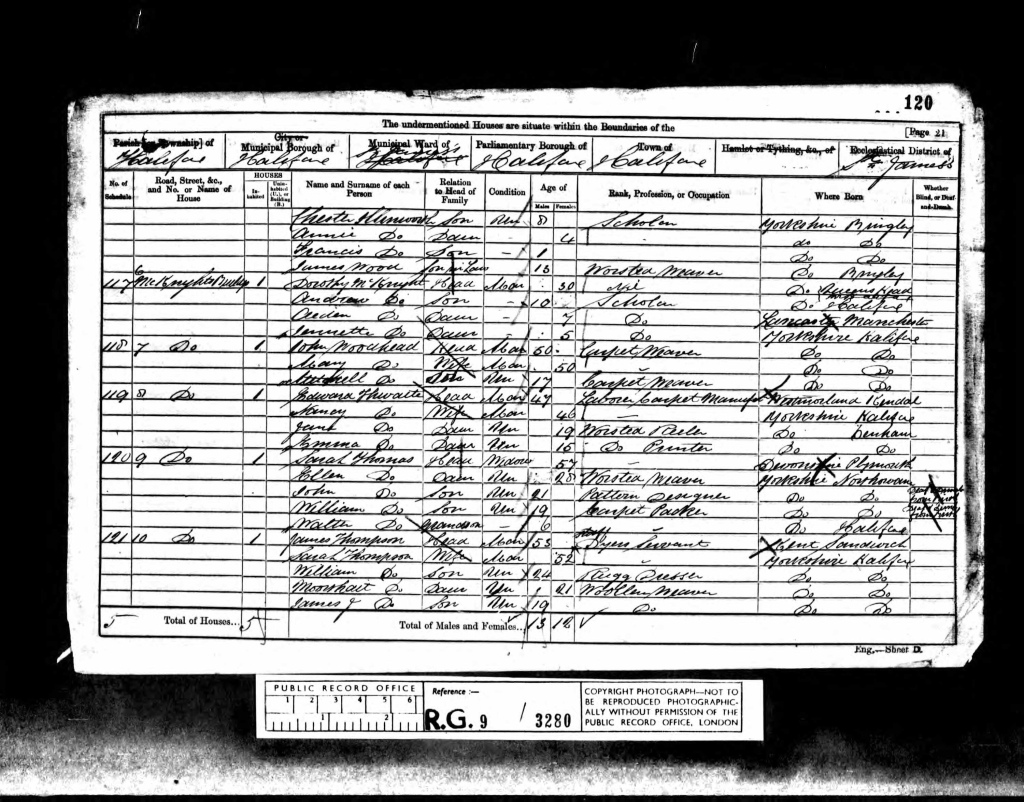Several of the pupils of the Yorkshire Institution for the Deaf and Dumb went into the textile industries of Halifax in the mid 19th century. Halifax had many mills, manufacturing wool, cotton and carpets. Crossley’s carpet mill at Dean Clough was the largest carpet factory in the world for much of the 19th and 20th centuries. The company went from having 300 employees in 1837 to 3,500 in 1864, then a massive 5,000 in 1868.

When William Thomas left the school, he got a job as a carpet packer, so it’s possible than he worked at Dean Clough mills. In 1861 he was 19, living with his widowed mother, his sister and his older brother, John. Like William, John was Deaf and the brothers had gone to school together. John worked as a pattern designer, which might have been in a carpet factory. I haven’t been able to find out where either of the brothers worked, there was no information other than occupation in the institution’s reports.

The family lived in the McKnights Building on Corporation Street, which was very close to Dean Clough.
William carried on working in carpet and wool warehouses. He married Eliza, a woman who had become Deaf as a result of having smallpox. In 1871 they had a one-year old daughter, but in the next census their only child is a nine year old son, James. It looks like little Sarah might have died in childhood.
Another pattern designer in Halifax was Joseph Scott, although he worked in the worsted business. His managers in the pattern design department wrote the following for the YIDD survey:
- As a pattern-designer for worsted goods.
- Yes, considering his infirmity, with great facility.
- His conduct has been unobjectionable.
- If he continues attentive he will in all probability become a very useful member of society.
J.F. Bland, J. Taylor, Pattern-designers in the firm of J. Ackroyd and Sons, Halifax.
We believe the above to be a correct statement of Joseph Scott’s capacity and general behaviour.
James Ackroyd and Sons.
Halifax, Feb. 26, 1847.

James Akroyd & Sons worsted business was possibly the largest worsted complex in the world. In 1847 Edward Akroyd took over the business. He was a benevolent employer and built Akroydon village, a model housing scheme in Boothtown, Halifax, for his workers.
In 1851 Joseph was 25, living with his brother John Wood Scott, 26 and sister-in-law Catherine, 26, plus a house servant, at 5 Jail Lane, Halifax. This is now Gaol Lane in the town centre.
A year later, Joseph died. He was buried at Holy Trinity church, Halifax.
(Incidentally, Joseph’s brother John also died young, in 1858 aged 33.)

Another of the Halifax ex-pupils, Christiana Shatwell, who started at the school in 1850, 15 years later than Joseph, worked as a worsted reeler at John Holdsworth’s spinning mill. She would have worked at Holdsworth’s large Shaw Mills complex, which is now the home of arts organisation Everybody Arts, along with many small businesses.
Reeling is the process of winding yarn into the form of hanks, skeins or reels, and Christiana did this job for over ten years. She was the only Deaf member of her family which changed around her while she remained unmarried.

Some members of the family, including Christiana and her mother, a widow by 1891, moved away from their home in Lily Lane, Halifax. They ended up living at the Royal Oak pub, Audley, Staffordshire with the innkeeper William Bickerton who it appears Christiania’s sister Mary had married. The Royal Oak is still serving drinks today.
Christiana moved out of the pub at some point, but stayed in Staffordshire until she died in 1904, aged 64, in Wolstanton.